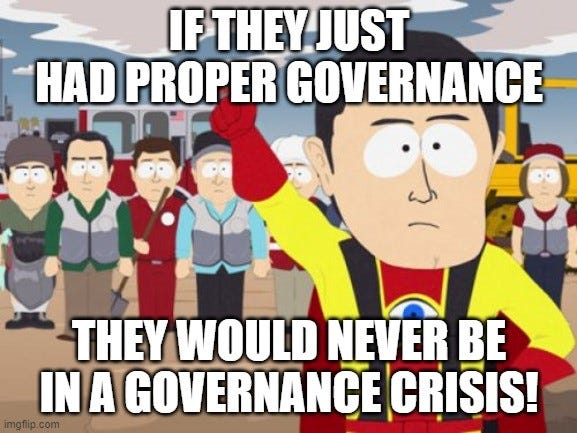Today I announced that I have co-founded GVRN alongside Chris Sirise (chris_sirise) and Tiff (@_locomotiff). This has not been an easy personal decision.
Why this is a terrible idea (for me)
There are numerous reasons why this is a terrible idea.
I am no longer the unfettered young man I was a decade ago when I was more than willing to recklessly gamble years for a shot at riches. Today I am a husband and a father to a one-and-a-half-year-old. Am I willing to give up precious family time?
I now run a successful advisory and corporate services firm alongside Tiff. Servicing both Web3 and TradFi clients, our current cash flows alone assure me a more than comfortable lifestyle, albeit still insufficient to purchase a reasonably sized house. Why risk building an ambitious product rather than stick to what we know?
I also open myself up to criticism. In my current role as an advisor and a Twitter Wassie, it is easy to throw stones at others from the peanut gallery. Becoming a founder means subjecting myself to the spotlight and necessarily – criticism. Is this something I am willing to subject myself to? Can my overinflated ego – as my wife often tells me – take the hit?
And finally there is the weight of responsibility. It is something perhaps many young founders do not understand – particularly in the Web3 gold rush. The founder of an endeavour is the captain of the ship – responsible not only for its direction but also its passengers, its cargo and its crew. And if the ship capsizes, the captain goes down with the ship. Seems like a terrible R:R when I am reasonably well compensated to flutter from ship to ship advising captains no?
Why I am doing it anyway
Whenever something goes wrong in our industry – especially when it comes to legal or governance related matters, I often have an opinion on it. An opinion I then share with the world in order to farm magic internet points (not even magic internet money!).
But what is the point of sharing insights on what could have been done better from a legal or governance perspective after the crisis has already happened?
Although it is certainly the case that I would never have become relevant to the public if not for the numerous high-profile collapses of 2022, wouldn’t the industry have been better served (and my bags looking a lot better) if we spent as much time thinking about legal and governance structures as we do on our tokenomics?
For what it is worth – I do my part. I have had the privilege of working with incredibly intelligent founders to help them design their legal and governance systems. Together, we have successfully built sensible governance structures and bridged them across into the traditional legal infrastructure to ensure that all of our understandings on the blockchain have legal force.
But I cannot stop thinking that there must be a better option. It cannot be that the only way to ensure that your Web3 product will not collapse to the first legal or governance crisis is to pay a handful of Web3-native lawyers (all of which barely have capacity to take on new clients) a sizable fee (for a pre-product startup) to set up your legal entities to limit your liability, raise funds, design the project’s governance, review the DAO’s constitution and implement the will of the DAO in a manner which gives it legal force.
I have theorised such a product since early 2020. Legal-tech designed by Web3 natives for Web3 natives working together in Web3 native organisations. I had a few reasons (or excuses) for not acting on it.
Who cares about these things?
Who am I to launch such a product?
How can I ensure corporate service providers are on board
Where will I get users?
How do I find the right team?
What if I need funding?
These excuses no longer hold water.
Founders are now acutely aware of these issues – especially since the spectacular implosions of 2022. I now have a large clientele and am a reasonably well-known lawyer in the space. Tiffany and I have built up our own corporate services firm over the past 2 years which has reliably serviced our clients across multiple jurisdictions. Embarking on this enterprise with Chris has blessed me with his experience, networks and a battle-tested product and development team. And between us, the question is no longer a matter of whether we can get funding – but who we should take money from if at all.
GVRN’s vision.
My vision for GVRN is to be the governance solution which frictionlessly bridges across the blockchain and legal infrastructure. Decisions made by anonymous token-holders via an on-chain vote seamlessly translated into corporate authorisations to implement those decisions. Entity incorporation and fund-raising which is founder-friendly and legally effective but cost-efficient. Treasury management and deployment decisions made by true governance – and not with multisig holders having de facto veto rights.
We want to usher in new standards for Web3 organisations. Because building a new financial system requires more than just a new economy – it requires new governance and legal frameworks.





"We want to usher in new standards for Web3 organisations. Because building a new financial system requires more than just a new economy – it requires new governance and legal frameworks."
Music to my ears.